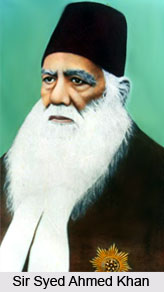 Sir Syed Ahmed Khan was the main proponent of promoting the Urdu language. With the onset of Hindi-Urdu controversy of 1867 saw the entry of Sir Syed as a strong political leader of the Muslim community. He also became a mainstream voice opposing the adoption of Hindi as a second official language of United Provinces (now known as Uttar Pradesh).
Sir Syed Ahmed Khan was the main proponent of promoting the Urdu language. With the onset of Hindi-Urdu controversy of 1867 saw the entry of Sir Syed as a strong political leader of the Muslim community. He also became a mainstream voice opposing the adoption of Hindi as a second official language of United Provinces (now known as Uttar Pradesh).
Sir Syed also perceived Urdu language as the lingua franca of Muslims. Having been developed by the Muslim of India, Urdu was used as secondary language to Persian - the official language of Mughal court. With the downfall of Mughal dynasty - Sir Syed promoted the use of Urdu in his writing. Under Sir Syed, the scientific Society translated Western works only into Urdu. The educational institutes set up by Sir Syed imparted education in Urdu medium.
The large section of the Hindus believed that Hindi should also be promoted. Sir Syed also promoted the use of western education. The success of the Hindi movement also led Sir Syed to further to advocate further the use of Urdu symbols of Muslim heritage and also as the language of all Indian Muslim. His political and educational work increasingly grew and centred around and exclusively for interests of Muslims.
He also persuaded the British Government to give Urdu extensive usage and patronage. His colleagues such as Mohsin-ul-Mulk and Maulvi Abdul Haq developed organisations such as the Urdu Defence Association and the Anjuman Taraqqi-i-Urdu, committed to the perpetuation of Urdu. All these people actually led to efforts that also resulted in adaptation of Urdu as official language of Hyderabad State and as the medium of instruction in the Osmania University. The population of Muslim in the northern and western India, Urdu language also became an integral part of political and cultural identity. However, the division over the use of Hindi or Urdu further provoked communal conflict between Muslims and Hindus in India.
On 1st April in the year 1869 Sir Syed went to England with his son, Syed Mahmood where he was awarded the Order of the Star of India from British Government on August 6. While in England, he travelled the length and breath of the country and paid visit to various colleges and was inspired by the standard of learning that existed.
There were committees formed under the chairmanship of Sir Syed and they issues proposals for the construction of colleges in Aligarh. He also worked towards publishing the journals named the Tahzib al-Akhlaq. He also seriously worked to reinterpret the Muslim ideology.
He worked towards establishing new schools and colleges and laid the foundation stone of the Muhammadan Anglo-Oriental College on May 24, 1875. The very next year he retired as a jurist. Sir Syed`s pioneering work received support from the British. Although intensely criticised by orthodox religious leaders hostile to modern influences, Sir Syed`s new institution attracted a large student body, mainly drawn from the Muslim gentry and middle classes. The college was originally affiliated with University of Calcutta but was transferred to the Allahabad University in 1885. Near the turn of the 20th century, it began publishing its own magazine and established a law school. In 1920, the college was transformed into a university.




















